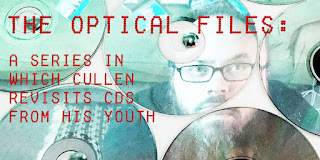With a new generation making noise in the NY scene (BDP, Public Enemy, Eric B. & Rakim) the old-schoolers were under pressure to compete. Kool Moe Dee, a legendary member of rap's pioneering Treacherous Three, & his style were already starting to seem like old hat. After his modestly successful 1986 self-titled album (that mainly contained retrofitted Treacherous Three material), Moe Dee was determined to prove that he could hang with the new jacks. Part of this strategy involved the battle-tested Moe Dee (just ask Busy Bee) picking a fight with one of the newer jacks, a cocky young cat named LL Cool J. He addresses this beef on at least 2 songs here, & the backed-into-a-corner energy pervades the entire record. The result is a firecracker of an album, with some of the best & most unique rhyme writing of his career, that had the misfortune of appearing in a stacked year.
Moe Dee pokes fun at his own reputation as an old head on "Way Way Back," where he uses a reverb effect on his voice & crowd samples to try to replicate the feeling of rapping in a packed club. It's funny that the "way way back" he's referring to is, like, 5 years ago? but hiphop as an art form advanced at breakneck speed in those early days. To a modern listener, the style he showcases on this track might not sound much different from his rhyming on the rest of the album. But what he's doing here is the original meaning of "freestyle": an extended rhyme on no particular topic, intended to showcase skill & hype up a crowd. Moe Dee's lyrics on the rest of the album are much more focused, & he uses more of his trademark multisyllables, which are mostly absent from "Way Way Back."
Let's talk about those multisyllables. Moe Dee frequently uses a technique where he carries a 2 (or more) syllable rhyme pair across a 2-word phrase, placed at the end of a bar while the sentence continues into the next bar. From the title track (a sub diss to LL): "Schemin' like a demon, you're screamin' & dreamin'/I'm from the old school, I used to see men/Die for less[...]" This creates a natural moment of suspense while you wait for the emcee to finish whatever he's saying. (In the above example, it has the added humor of initially sounding like "I'm from the old school, I'm used to semen.") Kool Moe Dee does this all the time. On "Rock You," another song taking aim at LL, he opens the song with "Boy you're going crazy, really getting lazy/Rhymes as weak as water, even shorter than the days we/Saw you on the pop charts[...]" (Note the internal rhyme he packs into this example as well.) Sometimes he even breaks a single word across the bar line for the sake of the rhyme: "I am authentic, like the Titanic/But I'm unsinkable, believe it & then ac-/cept it, it's reality[...]" I don't know if I've explained this well, & I don't know if there's a name for it. I've always called it the Kool Moe Dee technique.
A lot of rap albums from this era don't list specific producer credits, but I know that the great Teddy Riley, along with Chuck New & Kool Moe Dee himself had their hands in this. I don't know about each producer's specific contributions, but the popcorn synth bass & wordless "aah" vocals of "Wild Wild West" have Teddy Riley written all over them, as does the interpretation/interpolation of Aretha's horn stabs on "No Respect." Then there's the Paul Simon-sampling "50 Ways," with its deep, slow drumbeat with snare rolls & pitched toms that builds over the course of the track, which is wholly unlike most of the beats people were rhyming on in 1987. The track wasn't meant for dancing, & Moe Dee says as much. He's mostly not trying to make you move (although on an album packed with this many James Brown samples, it's hard not to)--the bars are the main attraction here.
Too bad we get another one of those slut-shaming anthems in the song "I'm a Player," where he criticizes a woman for having lots of sexual partners while bragging about doing the same thing himself. This one is notable for how close he comes to articulating the double standard while still somehow managing to miss the point: "If a guy has 100 girls, he's a hero/A girl with 100 guys is a zero/Don't blame me cuz society made the rule[...]" But that's the only stain on this otherwise lyrically flawless album. Moe Dee was always a rapper's rapper, & the clarity & power of his vocal delivery, the assuredness of his messages & the writerly precision are all evidence of a carefully honed craftsman experienced both onstage & in a vocal booth. "Rock You" particularly is a master class of intricate rhymes, close to the state of the art in 1987.
Mind you, I said "close to," because this album had the misfortune of dropping 8 months after Criminal Minded & 4 months after Paid in Full. Those 2 records completely changed the game in NYC, & even though How Ya Like Me Now was more commercially successful than either, the gauntlet was thrown down. People weren't looking to the past anymore. Moe Dee rode the LL Cool J beef to solid, but diminishing success for the next few years, but the writing was on the wall. How Ya Like Me Now is the peak of his solo career, & a document of a moment that passed almost before it even began.


























